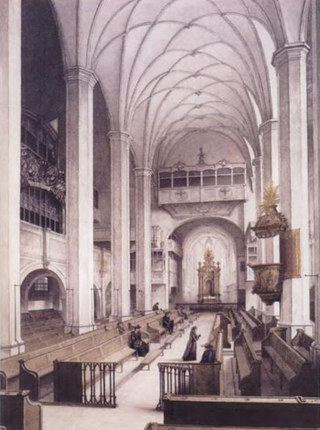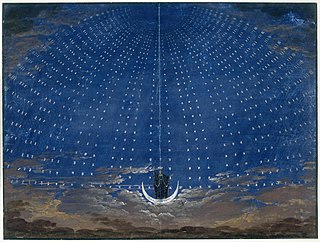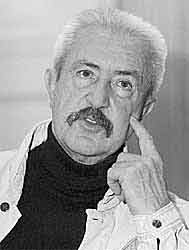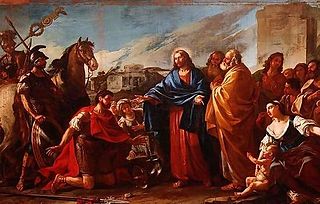
Johann Michael Bach was a German composer of the Baroque period. He was the brother of Johann Christoph Bach, as well as first cousin, once removed and father-in-law of Johann Sebastian Bach. He is sometimes referred to as the "Gehrener Bach" to distinguish him from the "Wuppertaler Bach", Johann Michael Bach (1745–1820).

Jacques Marin was a French actor on film and television. Marin's fluency in English and his instantly recognisable features made him a familiar face in some major American and British productions, and Disney movies.

"Under the Anheuser Bush" is a beer garden song commissioned by the Anheuser-Busch brewing company in 1903. With music by Harry Von Tilzer and words by Andrew B. Sterling, the title contains a pun on the surnames of the company's founders.

Bill: On His Own is a 1983 American made-for-television biographical drama film and a sequel to Bill (1981) starring Mickey Rooney as Bill Sackter. However, it was far less successful.

Johann Sebastian Bach composed the church cantata Es ist nichts Gesundes an meinem Leibe, BWV 25 in Leipzig for the 14th Sunday after Trinity and first performed it on 29 August 1723.

"O zittre nicht, mein lieber Sohn" is the first aria performed by the Queen of the Night in Mozart's singspiel The Magic Flute . It is not as well known as the Queen's second aria, "Der Hölle Rache kocht in meinem Herzen", though no less demanding; the aria requires a soprano coloratura with extremely high tessitura and great vocal flexibility.

Little Old New York is a 1940 American black-and-white historical drama from 20th Century Fox, produced by Darryl F. Zanuck, directed by Henry King, that stars Alice Faye, Fred MacMurray, and Richard Greene. The film is based on a play by Rida Johnson Young, which opened on Broadway on September 8, 1920, and starred Genevieve Tobin, Douglas Wood, and Donald Meek. It was previously adapted into a 1923 film starring Marion Davies.

Thomas Brasch was a German author, poet and film director.

Egon Günther was a German film director and writer.

Barbara Rütting, also known as Barbara Ruetting was a German film actress, politician, author and vegetarianism activist. She appeared in 50 films between 1952 and 1979.

"Ach Gott, wie manches Herzeleid" is a hymn in German in 18 stanzas attributed to Martin Moller (1587). It is often catalogued as a paraphrase of the Latin "Jesu dulcis memoria", a medieval hymn attributed to Bernard of Clairvaux, but only a few lines refer directly to this song. Hymn tunes were composed for the hymn, and it is also often sung to a tune composed for "Herr Jesu Christ, meins Lebens Licht". The anonymous hymn tune of "Herr Jesu Christ, meins Lebens Licht" first appeared in Wolflein Lochamer's Lochamer-Liederbuch, printed in Nürnberg around 1455. In Leipzig in the 1720s, Johann Sebastian Bach composed settings of Lochamer's hymn based on four of his church cantatas and a sacred motet.

Ach Gott, wie manches Herzeleid, BWV 58, is a church cantata by Johann Sebastian Bach. He composed the dialogue cantata in Leipzig for the Sunday after New Year's Day.

Jean Girault was a French film director and screenwriter. From 1951 to 1960 he worked as a screenwriter, mainly for comedy films. He made his film debut as a director in 1960. He directed more than thirty films between 1960 and 1982. In 1982, he died of tuberculosis at the age of 58.

Iris Renate Dorothea Berben is a German actress.

Johann Sebastian Bach composed the church cantata Ich glaube, lieber Herr, hilf meinem Unglauben, BWV 109, in Leipzig for the 21st Sunday after Trinity and first performed it on 17 October 1723.

Schau, lieber Gott, wie meine Feind, BWV 153, is a church cantata by Johann Sebastian Bach. He composed it in Leipzig for the Sunday after New Year's Day and first performed it on 2 January 1724.

Mein Gott, wie lang, ach lange?, BWV 155, is a church cantata by Johann Sebastian Bach. He first performed it in Weimar on the second Sunday after Epiphany, on 19 January 1716.
A Lively Christmas Eve is an East German comedy Christmas film, directed by Günter Reisch. It was released in 1962.
Bach's first cantata cycle refers to the church cantatas Johann Sebastian Bach composed for the somewhat less than 60 occasions of the liturgical year of his first year as Thomaskantor in Leipzig which required concerted music. That year ran from the first Sunday after Trinity in 1723 to Trinity Sunday of the next year:

"Ach lieben Christen seid getrost" is a Lutheran hymn in German with lyrics by Johannes Gigas, written in 1561. A penitential hymn, it was the basis for Bach's chorale cantata Ach, lieben Christen, seid getrost, BWV 114.
















